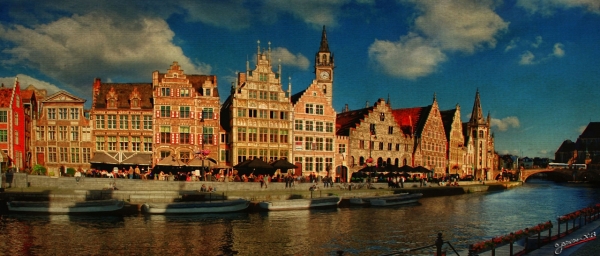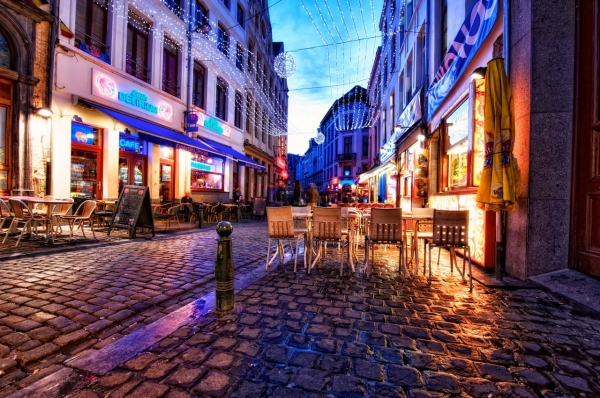Nu pierdeți cele mai bune locuri de muncă!
Abonează-te și săptămânal iți vom trimite un email cu ultimele locuri de muncă disponibile. Introdu adresa ta de email mai jos
Brussels, the seat of the European Union, is a major political capital in the world. Thousands of civil servants are stationed here for the EU and the NATO, meaning it is a great learning environment for aspiring political science talents. As a result, there are plenty of opportunities to intern at numerous institutions, making Brussels one of the largest intern or ‘stagiaire’ communities in Europe.
The city has other charms though. It truly embraces multiculturalism by hosting two vastly different cultures, the Flemish (Dutch speaking) and the Walloons (French speaking). These two groups of people learnt to coexist throughout the centuries to create a distinct culture, one that gave us wondrous Belgian beers and moules frites (literally mussels and fries).
If you are looking for a future to work abroad with the government, Brussels is a great place to start your career.
Where do you find an internship?
The websites of EuroBrussels and EurActive have comprehensive listings. Be mindful that each EU institution has their own application procedures for their internship program and very strict deadlines throughout the year. Sometimes they might get thousands of applicants for a single position, so you need to have an outstanding application.
How to put together a competitive application for internships within the EU:
- Standardized your application documents (CV, language passport, etc.) through EuroPass. This will make them much more likely to be read.
- Tailor your CV and cover letter. If you haven’t mastered this yet, watch some online tutorials or reach out to someone in your network, this is the time to figure out how to write a killer application.
- Always address your cover letter to someone, even better if you’ve met that someone in person.
What about…?
Language barriers: As with other work abroad experience, language capabilities can affect your chances. It is important that you speak one of these official EU languages with great proficiency: English, French or German, to be considered for an internship.
Competition: Although Brussels has a highly competitive landscape for internships, you can still have a good chance if you network, tailor each application and effectively convey your career aspirations.
Work Authorization: This is hit and miss with different institutions. Some require applicants to be an EU citizen, while others welcome all nationalities. Your eventual employer will be responsible for applying for your visa. However visa regulations are loose in Belgium, as they welcome international talents from all over the world.
What to keep in mind while job searching?
EU Institutions are notorious for their poorly paid or unpaid placements and the lack of prospects available post-internship. Therefore, do a thorough search before applying to any job. There is an online community called InternsGoPro that works hard to make interns’ voices heard. You can look there for ratings of internships. However, be mindful that this site is mostly made up of extreme opinions. Ask around for unbiased advice before making your mind up about an employer.
Can I survive on an intern’s salary?
An average intern in Brussels earns anywhere from €500-1,200, meaning some struggle to make ends meet and others live like royalty. All things aside, you can afford to have a drink on Friday afternoons in the hippest bar district - Place du Luxembourg.
| Average Cost in Brussels | |
| Rent | €400 |
| Food | €260 |
| Entertainment | €250 |
| Transportation | €55.50 |
| Travel | €200 |
| Total | €1,165.50 |
| Intern Salary | €1000 |
| Deficit | -€165.50 |
Life as an intern in Brussels
Brussels is another European capital overtaken by foreigners working abroad here, most of them young, broke and full of ambition. You also have the opportunity to meet people from opposite ends of the world.
According to Justine, a French girl who has lived in Brussels since 2011, “You don’t have to pay a fortune to live in your favorite neighborhood, you don’t have to make reservations to get into restaurants and you can stay fit by walking around everywhere.” She has a stern warning for anyone planning on moving to Brussels, “Be careful, once you move here, there’s no going back.”
Brussels is also strategically located in the middle of Belgium so you can freely explore the rest of the country, including famous cities such as Antwep and Ghent. You can also reach Paris, London, Amsterdam and Luxembourg within 2 hours on the Eurostar. Furthermore, there are cheap flights from Brussels to major capitals on other continents.
How to get a full time offer after your internship?
The original purpose of an internship is to assess the intern’s fit for a full time position. However, this is rarely the case in Brussels. Unfortunately, you cannot expect an offer with your existing institution. In this case, you need to be on top of your game during your internship so you have enough opportunities lined up afterwards.
Network like crazy: Make a list of all the employers you would like to work for and meet at least one contact for each workplace. When the time comes to job search, send them warm and personalized applications.
Ask your employer for feedback and references: To make up for the lack of pay and job security, institutions are often better places for learning. All things aside, make sure you make your career aspirations clear to them and ask for references.
Save up for downtime: Expect to be unemployed for a while after your internship. Try to save up so you have three months reserve, so you won’t become desperate for any job.
Learn French or Dutch: If you don’t know the local languages, try to be conversational in one of them by the end of your placement. Your prospective employers will be impressed by your efforts to blend in.
Good luck!
Sign in to publish a comment




Be the first to comment on this post.